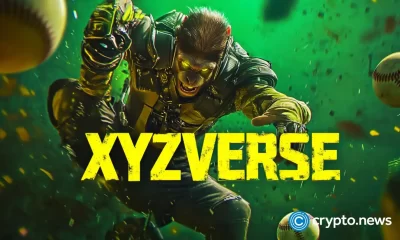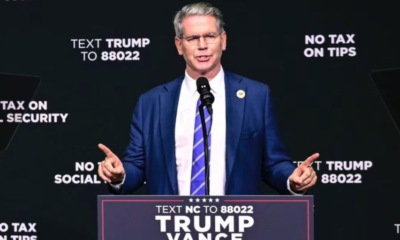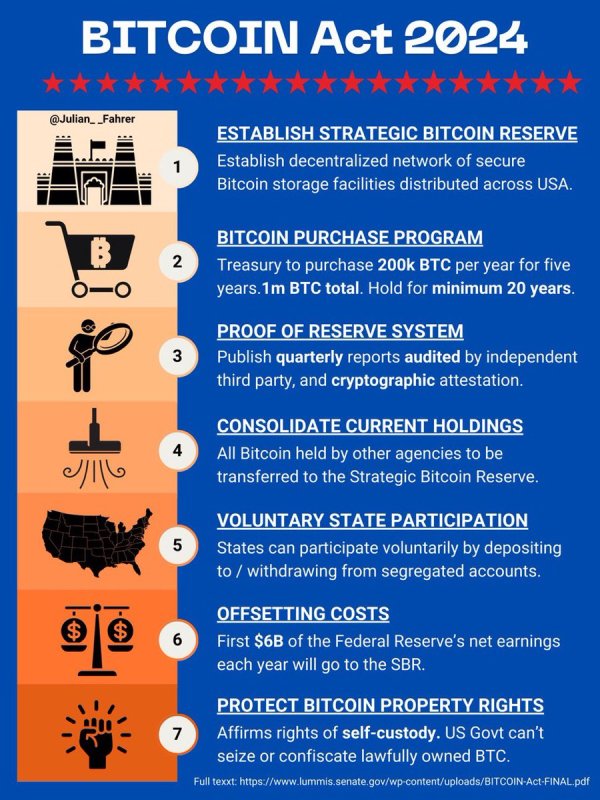Opinion
Bitcoin Won't Let You Transcend Politics
Published
4 weeks agoon
By
admin

#Bitcoin 'er pic.twitter.com/hGsYHMBqot
— ⚡₿itcoinTeddy⚡ (@Bitcoin_Teddy) October 7, 2024
We can’t transcend politics ‘because we have bitcoin now, bro’. Sometimes I see this kind of t-shirt or sentiment being shared online, but it’s simply misguided.
Just to prove I’m not strawmanning, here’s another similar example:
My condolences to anyone who pays attention to politicians 😅
Trust math, not politicians.
— FractalEncrypt ∞/21M (@FractalEncrypt) October 16, 2024
If you just mean “I’m not interested in politics” or you don’t like one particular party’s politics, that’s one thing, but it’s still not sufficient to secure your own liberty. As the saying goes, you may not be interested in politics, but politics is interested in you.
Zooming out a little bit here
Even if we abstract away from the upcoming US presidential election, politics more broadly is about making decisions in groups, and a reflection of power relations among individuals. We are determining who gets to control which scarce and rivalrous resources, ideally in a way that enables people to live together while reducing conflict. In a sense, Bitcoin does help reduce conflict over ownership of money, using cryptography.
But remember reality here
Now yes, we can talk about liberty, anarcho-capitalism and crypto-anarchy at a philosophical level. But the state exists today. So given this reality, if you want to secure your own political rights, it still matters to engage in some way. That could mean campaigning and contributing to bitcoin, economics and liberty focused education, it could be writing a submission to voice your opinion or lobby for a pro-bitcoin policy, it could mean being a part of a particular party, it could even mean contributing to secessionist movements and causes.
But entirely ceding the political turf to your enemies is a bad decision. In some cases, it is that the politicians are genuinely uninformed on Bitcoin, and they ‘follow it’ by seeing news headlines. In these genuinely uninformed cases, having educated Bitcoiners speaking to them, and helping them not make major mistakes will be helpful. It can reduce the risk of bad regulations or laws on bitcoin self custody, transfer, mining, node running etc. This can reduce the risk of bitcoiners being criminalised, reduce regime uncertainty, lower tax burdens or otherwise.
In other cases, there are politicians with an axe to grind about Bitcoin or Crypto, such as Elizabeth Warren with her “Anti Crypto Army”. In these cases, perhaps a more combative approach has to be taken where the community supports a pro-Bitcoin candidate instead of the anti-Bitcoin politician.
But what about cypherpunks writing code and existing in crypto-anarchy?
The late Hal Finney, Bitcoin legend and cryptography pioneer, was also libertarian and even he posted the following to a mailing list discussion (shout out to Aaron van Wirdum for surfacing this in The Genesis Book):
“I am not in cyberspace now; I am in California. I am governed by the laws of California and the United States even though I am communicating with another person, whether by postal mail or electronic mail, by telephone or TCP/IP connection. What does it mean to speak of a government in cyberspace? It is the government in physical space I fear. Its agents carry physical guns which shoot real bullets. Until I am able to live in my computer and eat electrons, I don’t see the relevance of cyberspace.”
It’s not that he was philosophically opposed to liberty or crypto-anarchy, it’s that he saw the real world limitations for what they were and are.
But wouldn’t it be nice if everyone got along? Kumbaya?
Yes there is the idealistic sense in which “Wouldn’t it be nice” or “what if we all just respected each other’s rights and ignored the state” – but the reality is that “people won’t all just”. They see a system that enables them to steal from other people or to control other people, and they will take advantage of it. This can manifest in very simple ways where politicians promise “free things” or to protect you from the boogeyman in exchange for power. Given that many voters in democracies are not net-payers into the system, of course they will not think about the long term. They will not think about the risk taken, or the effort to accumulate capital and build a business. For these selfish voters, they will just take whatever they can get here and now, and not think about the future.
Doesn’t Bitcoin Fix This?
Won’t Bitcoin fix some of these things though? Yes, it is true that the state uses cheap fiat credit and control over the money to expand itself. Yes it is true that the state undermines competing forms of private governance, such as the family, the community, even religion and private charity – in order to install itself as the more powerful government mechanism on which people depend.
As part of this process, more things are politicized, and this has taken place in most of our own lifetimes. There used to be unwritten rules about not talking politics while on a date, or in a polite social setting. That sense of decorum is now gone, and nowadays we all endure lectures about the latest ‘Current Thing’ even at non-political events.
Even in the hyperbitcoinized world, there will still be family politics about things like family business, or inheritance battles or divorce battles. Or if we have monarchies and free private city governance, there could still be politics involved. The benefit might just be that it’s easier to opt out of it, and everyday people aren’t forced to participate. So yes longer term, Bitcoin will reduce but not eliminate politics. But don’t confuse this world now, for that world later on.
If you think so much can be achieved politically, why have Bitcoin or code at all?
There’s a division of labor here. Bitcoin and writing code is absolutely essential. But my point is more that those people good at party politics should focus on that, and those people good at writing and reviewing code should focus on that.
Making the political system less hostile helps those people writing code, and it helps everyday HODLers who are holding their keys and running their node. After all, if Bitcoin and Bitcoin app code is improved, that could make it technically easier for people to use Bitcoin. In a broader political sense, writing code is reducing conflict by further reducing the cost of protecting money. It helps more people HODL and use their coins how they wish.
Summing it all up
Yes it would be nice if less people used the state to steal from each other, or control each other, but the pathway to get there does not mean you should just kneel down and take beatings from the other side. Yes it would be nice if we didn’t have to pay attention to these things, but that’s wishful thinking. Even if you personally don’t have the proverbial ‘stomach’ to wade into the swamp of political activism in favor of Bitcoin, the very least you can do is not poo-poo the efforts of those who do have the stomach for it. Likewise, the people who can do party politics or political activism should not poo-poo the efforts of those writing and reviewing code to improve Bitcoin.
Bottom line, don’t confuse the society you want, with the method of getting there.
This is a guest post by Stephan Livera. Opinions expressed are entirely their own and do not necessarily reflect those of BTC Inc or Bitcoin Magazine.
Source link
You may like


SHIB Lead Shytoshi Kusama Hints At TREAT Token Launch


Trader Says Top-10 Altcoin To Vastly Outperform Bitcoin and Ethereum, Hit New Record High Quicker Than Expected


5 tokens to consider buying today


Terra Luna Classic Community Discord On Proposal Amid LUNC Price Rally


Trump Nominates Pro-Crypto Hedge Fund Manager Scott Bessent as Treasury Secretary


Dogecoin surges 10% as this new altcoin shakes the market, and preps for stage 2 presale


BitVM earlier this year came under fire due to the large liquidity requirements necessary in order for a rollup (or other system operator) to process withdrawals for the two way peg mechanisms being built using the BitVM design. Galaxy, an investor in Citrea, has performed an economic analysis looking at their assumptions regarding economic conditions necessary to make a BitVM based two way peg a sustainable operation.
For those unfamiliar, pegging into a BitVM system requires the operators to take custody of user funds in an n-of-n multisig, creating a set of pre-signed transactions allowing the operator facilitating withdrawals to claim funds back after a challenge period. The user is then issued backed tokens on the rollup or other second layer system.
Pegouts are slightly more complicated. The user must burn their funds on the second layer system, and then craft a Partially Signed Bitcoin Transaction (PSBT) paying them funds back out on the mainchain, minus a fee to the operator processing withdrawals. They can keep crafting new PSBTs paying the operator higher fees until the operator accepts. At this point the operator will take their own liquidity and pay out the user’s withdrawal.
The operator can then, after having processed withdrawals adding up to a deposited UTXO, initiate the withdrawal out of the BitVM system to make themselves whole. This includes a challenge-response period to protect against fraud, which Galaxy models as a 14 day window. During this time period anyone who can construct a fraud proof showing that the operator did not honestly honor the withdrawals of all users in that epoch can initiate the challenge. If the operator cannot produce a proof they correctly processed all withdrawals, then the connector input (a special transaction input that is required to use their pre-signed transactions) the operator uses to claim their funds back can be burned, locking them out of the ability to recuperate their funds.
Now that we’ve gotten through a mechanism refresher, let’s look at what Galaxy modeled: the economic viability of operating such a peg.
There are a number of variables that must be considered when looking at whether this system can be operated profitably. Transaction fees, amount of liquidity available, but most importantly the opportunity cost of devoting capital to processing withdrawals from a BitVM peg. This last one is of critical importance in being able to source liquidity to manage the peg in the first place. If liquidity providers (LPs) can earn more money doing something else with their money, then they are essentially losing money by using their capital to operate a BitVM system.
All of these factors have to be covered, profitably, by the aggregate of fees users will pay to peg out of the system for it to make sense to operate. I.e. to generate a profit. The two references for competing interest rates Galaxy looked at were Aave, a DeFi protocol operating on Ethereum, and OTC markets in Bitcoin.
Aave at the time of their report earned lenders approximately 1% interest on WBTC (Wrapped Bitcoin pegged into Ethereum) lent out. OTC lending on the other hand had rates as high as 7.6% compared to Aave. This shows a stark difference between the expected return on capital between DeFi users and institutional investors. Users of a BitVM system must generate revenue in excess of these interest rates in order to attract capital to the peg from these other systems.
By Galaxy’s projections, as long as LPs are targeting a 10% Annual Percentage Yield (APY), that should cost individual users -0.38% in a peg out transaction. The only wildcard variable, so to say, is the transaction fees that the operator has to pay during high fee environments. The users funds are already reclaimed using the operators liquidity instantly after initiating the pegout, while the operator has to wait the two week challenge period in order to claim back the fronted liquidity.
If fees were to spike in the meanwhile, this would eat into the operators profit margins when they eventually claim their funds back from the BitVM peg. However, in theory operators could simply wait until fees subside to initiate the challenge period and claim their funds back.
Overall the viability of a BitVM peg comes down to being able to generate a high enough yield on liquidity used to process withdrawals to attract the needed capital. To attract more institutional capital, these yields must be higher in order to compete with OTC markets.
The full Galaxy report can be read here.
Source link
Michael Saylor
Microsoft Should Buy $78 Billion Worth of Bitcoin
Published
1 day agoon
November 22, 2024By
admin


As someone who has used Microsoft products my whole life, it pains me to see they are fumbling the bag on Bitcoin. The company’s $78 billion in cash reserves are losing value daily. Meanwhile, they stubbornly refuse to follow MicroStrategy’s proven winning strategy — convert those melting dollars to scarce Bitcoin!
Microsoft announced a couple of months ago that it would buy back shares up to $60 billion; it seems like this did nothing to increase the stock price. Imagine if they had bought Bitcoin instead. That money would have been much more powerful if allocated to Bitcoin. The company would likely have added hundreds of billions in market cap.
Just look at MicroStrategy. In just four years, they turned their $1 billion company into $100 billion by adopting Bitcoin as a treasury reserve asset. They are now the most compelling and successful story in corporate finance, with the best-performing stock in the last four years, beating every US company – even NVIDIA.
Yet Microsoft clings to an outdated financial strategy, destroying shareholder value. Microsoft should follow its technology instincts, not faulty financial logic. There is no long-term viability in holding cash.
I was listening to X Spaces yesterday, during which MicroStrategy’s CEO Michael Saylor revealed that he offered to explain Bitcoin’s benefits privately, but Microsoft’s CEO Satya Nadella rejected the meeting. Now, he is making a last-ditch appeal by presenting a 3-minute Bitcoin proposal to Microsoft’s board.
Earlier, the board already advised shareholders to reject assessing Bitcoin’s potential upside. Nonetheless, I am interested to see how this meeting will turn out. Saylor is a great educator, so you never know.
They should realise that no corporate treasury asset like Bitcoin can enhance enterprise value. Even a small $5 billion Bitcoin allocation could add tens of billions in market cap.
Look, Microsoft, the choice is clear – hoard melting dollars or embrace uncensorable digital gold. Your shareholders are begging you to buy Bitcoin. It’s time to listen before that $78 billion completely disappears. This is your fiduciary duty as Bitcoin continues mass adoption.
This article is a Take. Opinions expressed are entirely the author’s and do not necessarily reflect those of BTC Inc or Bitcoin Magazine.
Source link
$100
Bitcoin Nears $100,000 As Trump Council Expected To Implement BTC Reserve
Published
2 days agoon
November 22, 2024By
admin

What an enormous day it has been today.
Gary Gensler officially announced that he is stepping down from his position as Chairman of the Securities and Exchange Commission (SEC), and minutes later, Reuters reported that Donald Trump’s “crypto council” is expected to “establish Trump’s promised bitcoin reserve.” A bitcoin reserve, that would see the United States purchase 200,000 bitcoin per year, for five years until it has bought 1,000,000 bitcoin.

Right after both of those, Bitcoin continued its upward momentum and broke $99,000, with $100,000 feeling like it can happen at any second now.
It is hard to contain my bullishness thinking about the United States purchasing 200,000 BTC per year. They essentially have to compete with everyone else in the world who is also accumulating bitcoin and attempting to front run them. There are only 21 million bitcoin and that is a LOT of demand.
To put this into context, so far this year the US spot bitcoin ETFs have accumulated a combined total of over 1 million BTC. At the time of launch the price was ~$44,000 and now bitcoin is practically at $100,000. And that’s all ETFs combined. Imagine what will happen when just one entity wants to buy a total of 1 million coins, having to compete with everyone else accumulating large amounts as well?
I mean MicroStrategy literally just completed another $3 BILLION raise to buy more bitcoin, and will continue raising until it purchases $42 billion more in bitcoin. The United States are most likely going to be purchasing their coins (if this legislation is officially signed into law) at very high prices. The demand is insane and only rising in the foreseeable future.
With two months left to go until Trump officially takes office, it remains to be seen if this bill becomes law, but at the moment things are looking really good. As Senator Cynthia Lummis stated, “This is our Louisiana Purchase moment!” and would be an absolutely historic moment for Bitcoin, Bitcoiners, and the future financial dominance of the United States of America.
This is the solution.
This is the answer.
This is our Louisiana Purchase moment!#Bitcoin2024 pic.twitter.com/RNEiLaB16U
— Senator Cynthia Lummis (@SenLummis) July 27, 2024
This article is a Take. Opinions expressed are entirely the author’s and do not necessarily reflect those of BTC Inc or Bitcoin Magazine.
Source link

SHIB Lead Shytoshi Kusama Hints At TREAT Token Launch

Trader Says Top-10 Altcoin To Vastly Outperform Bitcoin and Ethereum, Hit New Record High Quicker Than Expected

5 tokens to consider buying today

Terra Luna Classic Community Discord On Proposal Amid LUNC Price Rally

Trump Nominates Pro-Crypto Hedge Fund Manager Scott Bessent as Treasury Secretary

Dogecoin surges 10% as this new altcoin shakes the market, and preps for stage 2 presale

Ripple CEO Shares Bullish News With XRP Army As Trump Names Treasury Secretary

On-Chain Data Shows The Bitcoin Price Bull Run is Far From Over

Trump Picks Pro-Crypto Hedge Fund Manager Scott Bessent for Treasury Secretary

Crypto millionaires will be made by April 2025: 6 coins to hold

Cardano Price Hits $1 But Analyst Says This Is Just The Start

Legacy Media’s Transformation: Why Evolution Beats Extinction

Massive Ethereum Buying Spree – Taker Buy Volume hits $1.683B In One Hour

Ethereum lags behind Bitcoin but is expected to reach $14K, boosting RCOF to new high

Bitcoin Miner MARA Buys Another 5771 BTC As Price Nears $100k
182267361726451435

Top Crypto News Headlines of The Week

Why Did Trump Change His Mind on Bitcoin?

New U.S. president must bring clarity to crypto regulation, analyst says

Ethereum, Solana touch key levels as Bitcoin spikes

Will XRP Price Defend $0.5 Support If SEC Decides to Appeal?

Bitcoin Open-Source Development Takes The Stage In Nashville

Bitcoin 20% Surge In 3 Weeks Teases Record-Breaking Potential

Ethereum Crash A Buying Opportunity? This Whale Thinks So

Shiba Inu Price Slips 4% as 3500% Burn Rate Surge Fails to Halt Correction

‘Hamster Kombat’ Airdrop Delayed as Pre-Market Trading for Telegram Game Expands

Washington financial watchdog warns of scam involving fake crypto ‘professors’

Citigroup Executive Steps Down To Explore Crypto
Mostbet Güvenilir Mi – Casino Bonus 2024

Bitcoin flashes indicator that often precedes higher prices: CryptoQuant
Trending

 2 months ago
2 months ago182267361726451435

 24/7 Cryptocurrency News3 months ago
24/7 Cryptocurrency News3 months agoTop Crypto News Headlines of The Week

 Donald Trump4 months ago
Donald Trump4 months agoWhy Did Trump Change His Mind on Bitcoin?

 News3 months ago
News3 months agoNew U.S. president must bring clarity to crypto regulation, analyst says

 Bitcoin4 months ago
Bitcoin4 months agoEthereum, Solana touch key levels as Bitcoin spikes

 Price analysis3 months ago
Price analysis3 months agoWill XRP Price Defend $0.5 Support If SEC Decides to Appeal?

 Opinion4 months ago
Opinion4 months agoBitcoin Open-Source Development Takes The Stage In Nashville

 Bitcoin4 months ago
Bitcoin4 months agoBitcoin 20% Surge In 3 Weeks Teases Record-Breaking Potential



